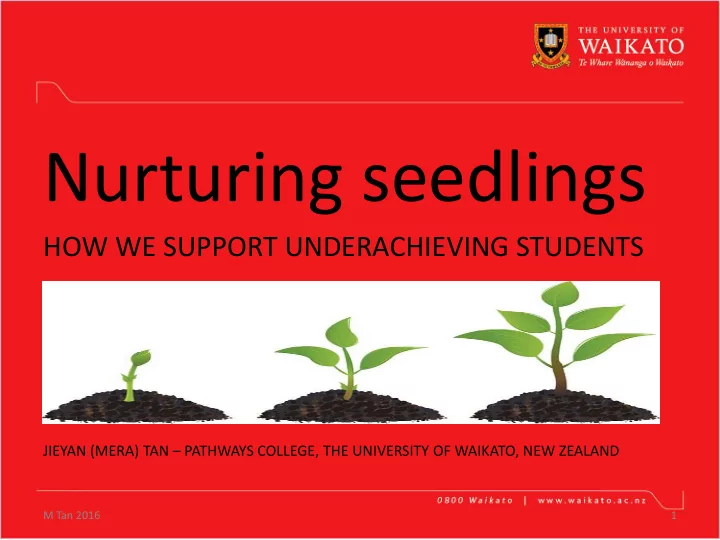

Nurturing seedlings HOW WE SUPPORT UNDERACHIEVING STUDENTS JIEYAN (MERA) TAN – PATHWAYS COLLEGE, THE UNIVERSITY OF WAIKATO, NEW ZEALAND M Tan 2016 1
Rationale • Improve the English language and academic success of underachieving students • Increase students’ sense of self -efficacy and self-regulation • Increase student engagement and the uptake of services • Improve student retention and transition into degree studies M Tan 2016 2
Intervention Programme 1) Systematic monitoring 2) Individual coaching 3) Collaboration of support services M Tan 2016 3
Systematic Monitoring • What literature says about monitoring - systematic and purposeful observation - involves giving feedback about the progress (Phil, 2007). M Tan 2016 4
Systematic Monitoring • Attendance and academic report system • Monitoring approach M Tan 2016 5
Individual Coaching • What literature says about coaching - to help individuals regulate and direct their interpersonal and intrapersonal resources to better attain their goals - to facilitate the coachee’s movement through the self-regulatory cycle. (Grant, 2001) M Tan 2016 6
Individual Coaching • Coaching approach M Tan 2016 7
Collaboration of support service • Tailored academic support • Disability support and counselling services • Student wellbeing and safety M Tan 2016 8
The Study Pathways College Intervention Programme 2011 – 2016 60 50 40 30 20 10 0 2011 2012 2013 2014 2015 2016 (Jan-Jul) No. of underachieving students Age (18-21) Age (21 above) Male Female Nationality (Chinese) Nationality (Saudi) Nationality (Other) M Tan 2016 9
Case study: student A • Enrolled into English programme in March 2010. • Had been observed/identified as having Aspergers spectrums and had significant difficulties socially and with learning by that time. • Formed attachment with certain teachers and student advisor. M Tan 2016 10
Case study: student B • Enrolled into English programme in March 2012 as a Saudi Arabian Scholarship student. • Failed Level 5 and was under pressure to meet English requirements within the time frame to study Foundation programme. • Needed to look after his twin brother who just came to New Zealand for English study at that time. M Tan 2016 11
Case Study: student C • Was a shy young lady who joined the English programme in January 2013. • Found it very hard to cope with the tertiary learning requirements within the university context. • Failed Level 6 and lacked confidence to move onto the Bachelor of Tourism as planned. M Tan 2016 12
The study M Tan 2016 13
Reflection on achievements • More engaged students in class • Increased academic success • Increased transition into university studies • Increased student uptake in services • Building of a community M Tan 2016 14
Reflection on future improvement • More community involvement • Develop a buddy/mentor system • More time for actual use of the English Resource Centre • More resources to assess/evaluate impact of the intervention • Resources and cost of support vs. results and outcomes M Tan 2016 15
References Aek, P., David, H., & Lindy, W. (2013). It’s not only English: effects of other individual factors on English language learning and academic learning of ESL international student in Australia. Journal of Research in International Education, 12 (3), 239-258. Edward, L., Meyen, B. J., Aust, Yvonne, N. B., & Robert, I. (2002). Assessing and monitoring student progress in an E-Learning personnel preparation environment. Teacher Education and Special Education, 25 (2): 187-198. Grant, A.M. (2001). Towards a psychology of coaching, Unpublished manuscript, Sydney. Lan, W. Y., Bradley, L., & Parr, G. (1993). The effects of a self- monitoring process on college students’ learning in an introductory statistics course. Journal of Experimental Education, 62 (1), 26-40. Pajares, F. (2001). Toward a positive psychology of academic motivation . Journal of Educational Research, 95 (1): 27-35. Pajares, F., & Valiante, G. (2002). Students’ self -efficacy in their self-regulated learning strategies: A developmental perspective. Psychologia, 45 (4): 211-221. Perry, R.P., Hechter, F. J., Mence, V. H., & Weinberg, L.E. (1993). Enhancing achievement motivation and performance in college Students-an attributional retraining perspective. Research in Higher Education , 34 (6), 687-723. Phil, B. (2007). The Nature of Monitoring and Evaluation , Retrieved from http://cec.vcn.bc.ca/cmp/modules/mon-wht.htm M Tan 2016 16
Recommend
More recommend